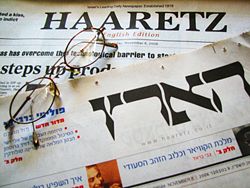Written by Aliza Kline, Executive Director

Mikveh is in the news here in Israel. Not regarding the battle of allowing Reform and Conservative clergy to bring conversion candidates to the mikveh – though that’s still ongoing in the courts. This is a new case that could have far reaching consequences – though for me it raises a number of fundamental questions about the “Jewish” part of Israel’s democracy.
The case is described here in an article in Haaretz, Israel’s version of the New York Times. In short, Israeli Orthodox single women are petitioning the Israeli Supreme Court asking to remove restrictions on mikveh usage by single (not married / divorced / widowed – I’ll add in lesbian) women. Attorney Susan Weiss filed on behalf of two young women and The Center for Women’s Justice (which she founded) and the Orthodox feminist group Kolech. Both of these organizations are heroic – determined to support the rights of women in both religious and secular spheres – not an easy task in today’s Israel.
We don’t know much about the individual petitioners except that they are single and that they were turned away by the balaniot (mikveh attendants) explicitly for not being married. They have not clarified their reasons for immersing and, in fact, argue that they need not divulge their personal reasons. One woman, Pliah Oryah, a 19-year-old who immerses monthly, often covers her hair to appear like a married woman when she goes to the mikveh to avoid questions.
There are a number of online discussions – on Facebook especially – disputing that mikveh attendants inquire about marital status. Once when I was going to immerse, a mikveh attendant in the States asked me the name of my husband. Though I had “the right answer” I still remember a brief moment of panic wondering if I would raise suspicion when I shared that we have different last names, or if they’d know he is a Reform rabbi. My thoughts were totally irrational- as is the whole situation.
First – mikvaot are pools of water. That’s it. There are carefully designed collection pools to ensure just the right amount of mayyim hayyim – living or naturally collected water. But once the water is collected and the pools are maintained, as they should be, the immersion of one person has no effect on that of another. Mikvaot have the status of lo mkabel tumah – that is they cannot be made ritually impure.
But that’s not the issue here. The official Israeli Rabbinate, which oversees religious life in Israel, knows all about how mikvaot are built and maintained. We are not talking about halakha (Jewish law), we are talking about control.
The case before the Israeli Supreme Court argues that mikvaot are public resources, paid for by taxes, and therefore should be open to all citizens of Israel, regardless of marital status. It’s a good point and a fascinating case.
However, I am interested in a different question. Should the mikvaot be public resources paid for by taxes in the first place? Should mikveh attendants be government employees (they are currently on the lowest rung of public service)?
What would happen if mikvaot were privatized? There are a number of private Hareidi (Ultra-Orthodox) mikvaot. In some cases these are much nicer and more accessible to physically handicapped women. In these communities mikveh is a high priority – though to be sure – the use of these mikvaot is strictly limited to women observing the laws of niddah (there are separate mikvaot for men to immerse before Shabbat and holidays). When they are private, they can set their own policies regarding access.
When mikvaot are public – they must be open to everyone. But the Rabbinate is not interested in everyone. It is not interested in creating a welcoming and inviting space that honors the women seeking to immerse. It is interested in setting boundaries; in enforcing its increasingly narrow view of “legitimate” ritual observance.
I am working with a few groups of women and men interested in creating a new model for mikveh in Israel. One that is not under the Rabbinate, one that can create its own policies – and one that seeks to be as welcoming and inclusive as possible. Starting by not asking questions of the immersees, except perhaps, “Is there anything I can do to make your experience more meaningful?”
We have our work cut out for us. In the meantime, we will watch this case closely. We will support training of Israeli mikveh attendants to raise their stature among public servants. We will use this blog to help raise awareness that there are options for women, and men, seeking to immerse openly, for their own reasons, without disguise.
Aliza Kline, Founding Executive Director, has led Mayyim Hayyim from its initial stages, overseeing fund raising, publicity, design, construction, staffing, recruiting volunteers, and board development. In May, 2009, Aliza was awarded an AVI CHAI Fellowship (best described as the “Jewish MacArthur Genius Grant”) in recognition of her accomplishments, creativity and commitment to the Jewish people

